YOU WAKE UP IN THE MIDDLE OF THE NIGHT with stomach pain, fever, and sweats. Was it the questionable sushi from the gas station? Or the coughing kids you sat next to on your public transit adventure yesterday? You can’t call the doctor’s office at 3 am, so you reach for your trusty smartphone and check in with Dr. Internet. We’ve all done this, and the results can often be more than intimidating, it’s either definitely cancer, you’re pregnant, or just a rash.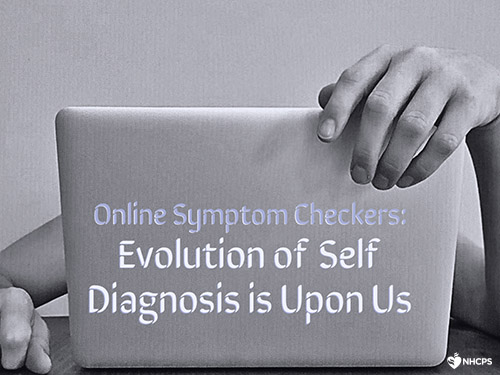
Symptom checkers have two primary functions: to facilitate self-diagnosis and assist with triage. Coupled with the recent exponential growth in medical technology and modern digital engineering, they are becoming more widely adopted, trusted and accurate every day. Lock some medical experts and software engineers in a room for a few days and they’ll spawn an app that provides a conjectured diagnosis based on the various possible responses the user (patient) provides. The algorithms vary across each checker, using branching logic, Bayesian inference, or other proprietary methods. All the tech mumbo jumbo aside, everyone is jumping on this train and many of us can’t imagine what life was like without the internet to help us navigate our ailments.[/vc_column_text][vc_column_text]
Your Search History Indicates?
While there are literally pages of symptom checker apps in the Google Play Store and iTunes, now Google has added a new layer of results for mobile queries it identifies as symptom or illness related.
According to this recent interview with Google’s product manager Veronica Pinchin stated:
Previously, you had to know the name of the conditions, treatment, or specific medical term to find high-quality information. But with symptom search, you can use your own language to describe what you’re feeling and see a list of high-quality medical results.
Even Microsoft’s Bing is working on ways to predict a user’s ailment by analyzing their search history, researchers reported that they could identify from 5 to 15 percent of pancreatic cases with false-positive rates of as low as one in 100,000.
How Comfortable Are We With Symptom Checkers?
According to a survey conducted by Phillips North America, 40 percent of Americans are comfortable using websites and apps to check their own symptoms. In addition, one in 10 Americans feel that web-based health information has saved their lives. With accuracy improving quickly, even doctors are incorporating them into their websites and electronic medical records. By encouraging patients to learn more about their symptoms and possible causes prior to the office visit, this saves everyone time & money, significantly improving efficiency all around. Aside from decreasing demand for primary care providers, symptom checkers also deter the overuse of prescribing antibiotics.
A study published by BMJ in 2015 titled Evaluation of Symptom Checkers for Self Diagnosis and Triage, took an in-depth look at symptom checker accuracy and use by testing 23 commonly used symptom checkers. Researchers found that of the 23 symptom checkers analyzed, 34 percent provided the correct initial diagnosis in standardized patient evaluations, 54 percent provided the correct diagnosis out of the first 20 potential diagnoses given, and 57 percent provided the appropriate triage advice (triage advice included recommendations on when to seek emergent care, non-emergent care or self-care).
As you can see, symptom checkers have both benefits and drawbacks in diagnosis and triage advice, as they are not always correct. Researchers of the BMJ study found that symptom checkers can encourage patients with a life-threatening problem, such as a stroke or heart attack, to seek emergency care. For patients with non-emergent problems, symptom checkers can offer reassurance and recommend self-care techniques to avoid unnecessary hospital visits and treatments at home. Researchers found, however, that these tools are generally risk-averse, meaning patients are urged to seek care more often than not, even when self-care is realistic. It is important to note that symptom checkers have also been found to do the opposite, misdiagnosing patients with a life-threatening problem, worsening their illness.
Nine Free Symptom Checkers We Tested
Which symptom checkers are best? We tried out nine free popular online and smartphone symptom checkers to help you decide which is best for you.
1. Mayo Clinic (Online)
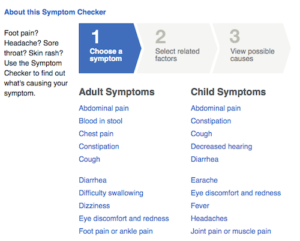 With nearly 1.2 million views annually, the Mayo Clinic Symptom Checker offers a list of both adult and child symptoms, then triages the user after selecting the general symptom. The patient is then directed to very specific related factors. The user can add as many specific symptoms as desired. Finally, a list of possible causes and a comparison of the associated factors are offered.
With nearly 1.2 million views annually, the Mayo Clinic Symptom Checker offers a list of both adult and child symptoms, then triages the user after selecting the general symptom. The patient is then directed to very specific related factors. The user can add as many specific symptoms as desired. Finally, a list of possible causes and a comparison of the associated factors are offered.
Another unique feature about the Mayo Clinic symptom checker is a sidebar of when to seek medical care and the option to learn all about the projected injury or illness.
Unfortunately, there is not a current mobile or tablet version, meaning the user has to have a computer with Internet access to use the tool. We also found that the symptom checker seems to only include text in English, not images or videos, which can be exhausting to read through and add confusion.
Pharmacy Times reported Mayo Clinic 59% accurate in diagnosis decision and triage advice.
2. iTriage (Online and Smartphone App)
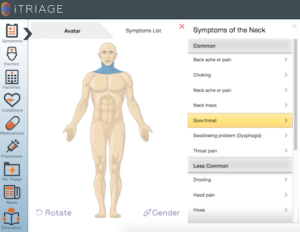 With a reported 50 million users each year, iTriage is a popular choice among patients and doctors. Continually upgraded, iTriage Symptom Checker allows users to add demographics and multiple associated symptoms in addition to a primary symptom.
With a reported 50 million users each year, iTriage is a popular choice among patients and doctors. Continually upgraded, iTriage Symptom Checker allows users to add demographics and multiple associated symptoms in addition to a primary symptom.
One pro about this symptom checker is the option to start by entering symptoms using an avatar locater (if the patient isn’t sure what symptoms are present) or using a Symptoms List feature to start. After selecting the initial symptom, the user will be directed into another tab that displays the causes for the symptom. The patient can get a brief overview of the projected ailment and see helpful images or videos. The patient can also enter in a location that will direct him or her to a medical provider that can assist in the assumed cause. Users can also create a My iTriage account to save the information into a database much like a personal electronic record.
iTriage, however, can be confusing as there are often several potential causes, overwhelming the user.
Pharmacy Times reported iTriage 64% accurate in diagnosis decision and triage advice.
3. WebMD Symptom Checker (Online and on Google Play for Android)
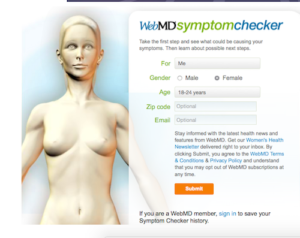 Like iTriage, the WebMD Online Symptom Checker uses an avatar feature that allows the patient to pinpoint the location of pain or discomfort and then promotes the user to be more specific with a list of symptoms.
Like iTriage, the WebMD Online Symptom Checker uses an avatar feature that allows the patient to pinpoint the location of pain or discomfort and then promotes the user to be more specific with a list of symptoms.
We found the WebMD checker to be very elaborate, asking specific questions with each added symptom. In addition, the patient can add multiple symptoms at a time. The result is a list of potential causes, which can be individually selected and reviewed, printed for a personal record, given to health care providers or saved for future reference.
Pharmacy Times reported WebMD 51% accurate in diagnosis decision and triage advice.
4. AskMD (Smartphone App)
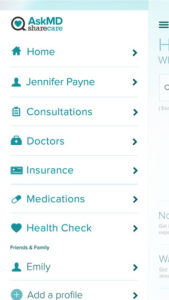 AskMD, a smartphone application for iPhone and Android on platform Sharecare, is a relatively newer compared to many other symptom checkers and is actually recommended by Dr. Oz, medical TV personality. According to an article written by Dr. Oz, AskMD is based on over 20 years of medical research and utilizes Pattern Recognition Technology.
AskMD, a smartphone application for iPhone and Android on platform Sharecare, is a relatively newer compared to many other symptom checkers and is actually recommended by Dr. Oz, medical TV personality. According to an article written by Dr. Oz, AskMD is based on over 20 years of medical research and utilizes Pattern Recognition Technology.
We found several benefits to AskMD, including the ability to refer patients to specialists in their area, and keeping doctors and insurance information in one spot. AskMD summarizes and saves consultation information, allowing patients to share it with family and medical providers. Because it uses smartphone technology, AskMD is the only symptom checker we found to have a microphone voice feature if the user is unable to type and for ease of use.
Unfortunately, AskMD is only available on smartphones and there is no avatar feature, so users have to manually search for one symptom at a time.
Pharmacy Times reported AskMD 68% accurate in diagnosis decision and triage advice.
5. Everyday Health Symptom Checker (Online)
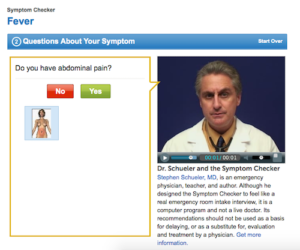 Developed by an emergency physician, teacher, and author, Dr. Stephen Schueler, the Everyday Health Symptom Checker is one of the most unique online symptom checkers we have reviewed. It’s an interactive video take on a real emergency room interview.
Developed by an emergency physician, teacher, and author, Dr. Stephen Schueler, the Everyday Health Symptom Checker is one of the most unique online symptom checkers we have reviewed. It’s an interactive video take on a real emergency room interview.
Dr. Schueler himself interactively talks the user through symptoms, asking questions that will prompt the patient into a new interview question video based on answers given. Once the video interview is complete, Dr. Schueler will tell the patient whether or not a doctor’s visit is necessary and how urgent the visit is. The user will then be instructed on where to go for care, what tests may be performed and receive options to find specific health care providers specializing in the predicted cause.
The Everyday Health Symptom Checker featured many advantages. The video feature helps users better understand symptoms before going click crazy which can end up making users think they have a deadly disease instead of just the common cold. The specific questions also included photos if applicable, helping users better identify symptoms.
6. Symptify (Online and Smartphone App)
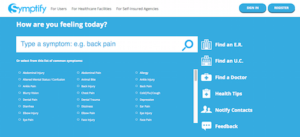 Developed by ER doctors and software engineers, Symptify is a standard symptom checker but does have features that can benefit users to empower them to make better health decisions, according to the site. Patients can freely type in whatever is bothering him or her or can choose from a list of common complaints. The user will then be prompted to answer questions pertaining to provide symptoms that are more specific. Symptify creators wanted users to stop using search engines alone to make a diagnosis, and have a place to better store the most relevant content into one consultation.
Developed by ER doctors and software engineers, Symptify is a standard symptom checker but does have features that can benefit users to empower them to make better health decisions, according to the site. Patients can freely type in whatever is bothering him or her or can choose from a list of common complaints. The user will then be prompted to answer questions pertaining to provide symptoms that are more specific. Symptify creators wanted users to stop using search engines alone to make a diagnosis, and have a place to better store the most relevant content into one consultation.
We found some pros of Symptify that others didn’t have, like a feature that allows users to send their predicted causes directly to their chosen medical providers before arrival so that the facility can better prepare for arrival with questions and appropriate intervention prior to arrival. In addition, the diagnosis and information are very basic and in layperson terms for everyone to understand.
7. Symcat (Online)
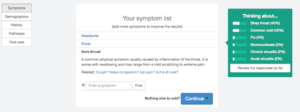 Symcat is an online symptom checker much like the others we reviewed but uses real, current patient data to tell users what illness or injury other users who experienced the same symptoms had. The online tool has patients manually enter in all symptoms at once while suggesting other related symptoms. With each additional symptom added, Symcat gives the user a list of possible causes with percentages of how likely the user is experiencing the cause.
Symcat is an online symptom checker much like the others we reviewed but uses real, current patient data to tell users what illness or injury other users who experienced the same symptoms had. The online tool has patients manually enter in all symptoms at once while suggesting other related symptoms. With each additional symptom added, Symcat gives the user a list of possible causes with percentages of how likely the user is experiencing the cause.
Users are then asked for medical history and asked additional questions specific to the information provided to help patients find the probable illness and direct him or her to the type of care needed.
We found a few advantages to Symcat that others did not include, such as a final care guide, which compares the cost and wait time of care options and allows the user to schedule an appointment right then and there on ZocDoc. In addition, we like how thorough the medical history questions were compared to other symptom checkers.
Unfortunately, the design of Symcat is not visual, there is no avatar, photos, and videos to help guide users and the text-only format can get difficult to read.
Pharmacy Times reported Symcat 71% accurate in diagnosis decision and triage advice.
8. Isabel Symptom Checker (Online and Smartphone App)
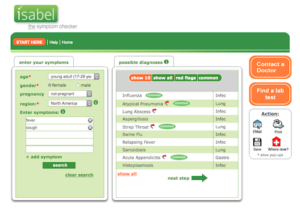 The Isabel Symptom Checker, or the one that doctors use is claimed to be much more sophisticated than other symptom checkers, as it uses the latest searching technologies and a database of over 6,000 diseases in everyday language terms with the same elaborate system used by nurses and doctors. Isabel took 12 years of development, and was designed to be used when patients feel unconfident in their doctor’s diagnosis, or when patients want to make sense of the vast amount of medical knowledge on the Internet with a trusted and accurate source.
The Isabel Symptom Checker, or the one that doctors use is claimed to be much more sophisticated than other symptom checkers, as it uses the latest searching technologies and a database of over 6,000 diseases in everyday language terms with the same elaborate system used by nurses and doctors. Isabel took 12 years of development, and was designed to be used when patients feel unconfident in their doctor’s diagnosis, or when patients want to make sense of the vast amount of medical knowledge on the Internet with a trusted and accurate source.
The Isabel Symptom Checker allows users to enter an infinite number of symptoms instead of limiting users to a certain amount in addition to the option of entering chronic illnesses or symptoms. It then decides on the top 10 probable causes and offers web resources for each cause to help users better understand their condition. Patients can email, print or save the results and find care within their area.
Isabel, however, did have some downfalls. Like Symcat, it is not visual and does not include an avatar or any visual elements. In addition, Isabel directs users to web resources, such as Wikipedia, that can be filled with an overwhelming amount of information that the patient may or may not wish to sift through.
Pharmacy Times reported Isabel 69% accurate in diagnosis decision and triage advice.
9. FamilyDoctor.org (Online)
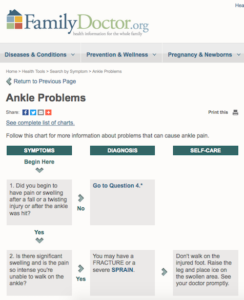 A health tool developed by the American Academy of Family Physicians is much like the other text-based symptom checkers we reviewed, but uses flowcharts to allow users to easily track symptoms and come up with a possible diagnosis.
A health tool developed by the American Academy of Family Physicians is much like the other text-based symptom checkers we reviewed, but uses flowcharts to allow users to easily track symptoms and come up with a possible diagnosis.
Like mentioned, it does not include any visual body locator features and is very text-heavy, but for users who understand flowcharts, it is a very useful tool.
Pharmacy Times reported FamilyDoctor.org 56% accurate in diagnosis decision and triage advice.
Online symptom checkers all utilize algorithms, current engineering and technology, and medical knowledge to offer direction on where to take your symptoms. It’s safe to assume that even the best ones aren’t always accurate, which is why a visit or call to a primary care physician is the safest bet. Online symptom checkers, however, are a great tool to help guide patients to the right direction.
Online symptom checkers don’t stop with humans, pet symptom checkers are also becoming commonplace, such as PetMed. Remember though, it is always best to check with your doctor or vet when any symptoms or issues arise.
Which online symptom checkers do you use most? We love to hear your thoughts in the comments below.







The FamilyDoctor.org symptom checker is way better. Check it out!